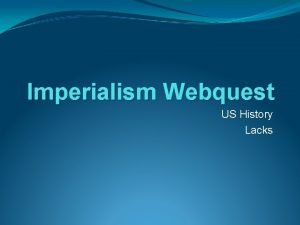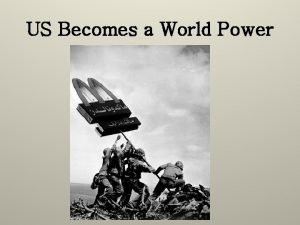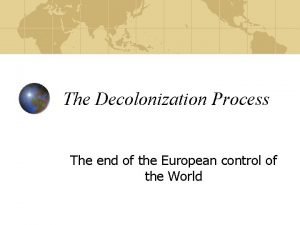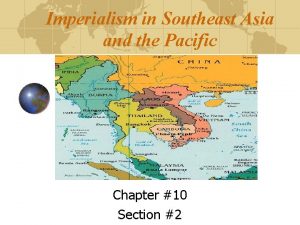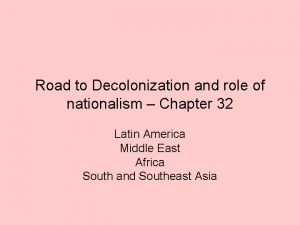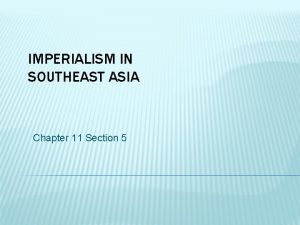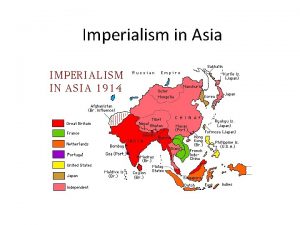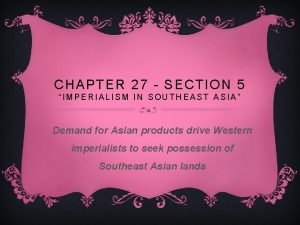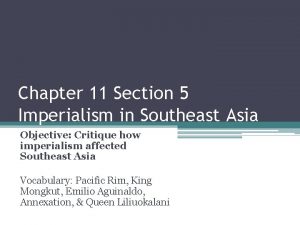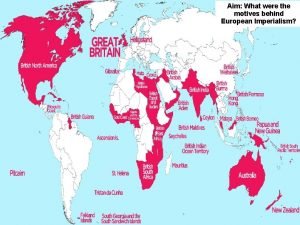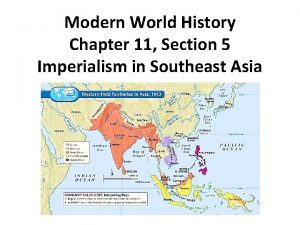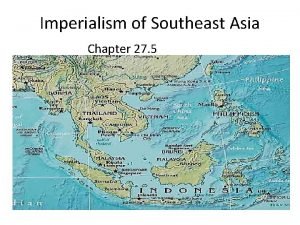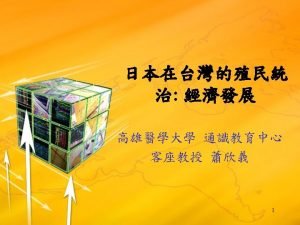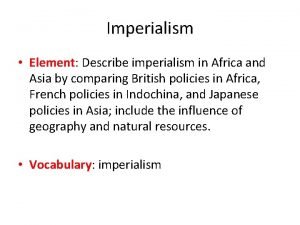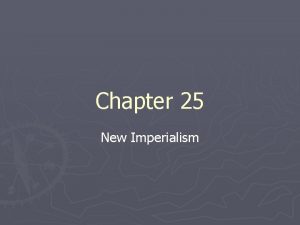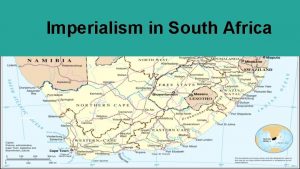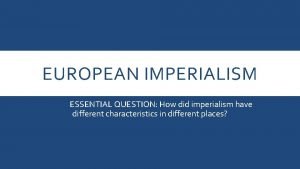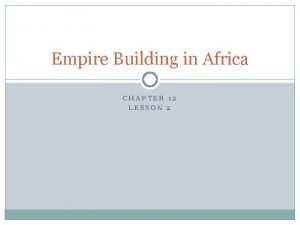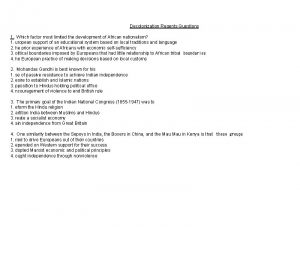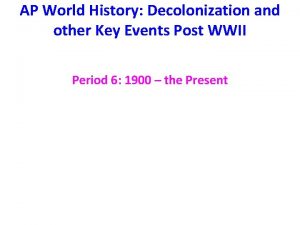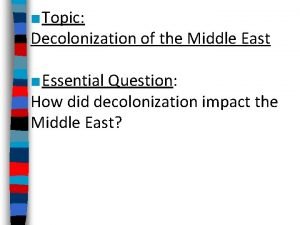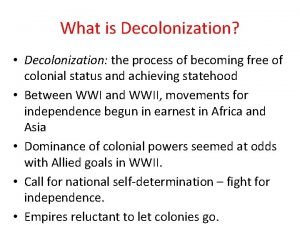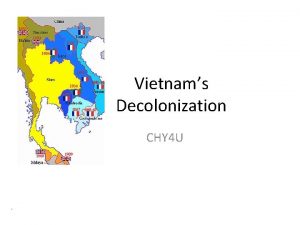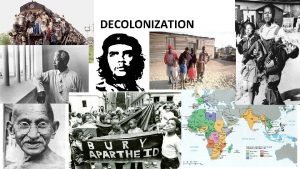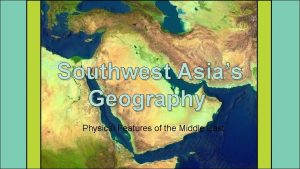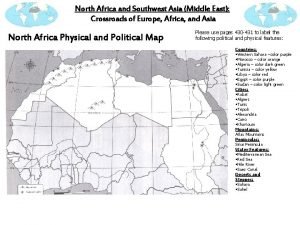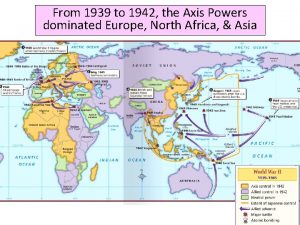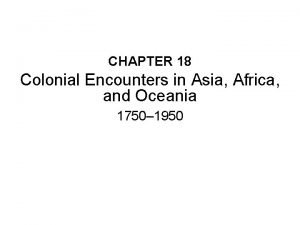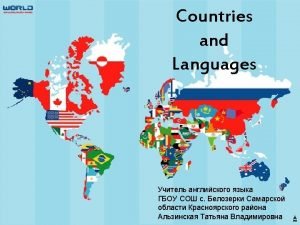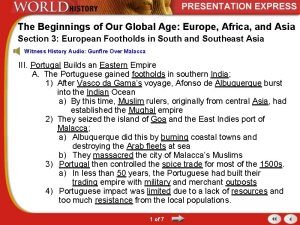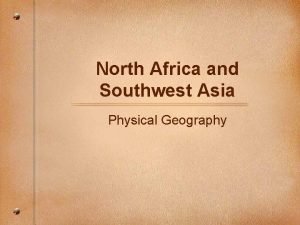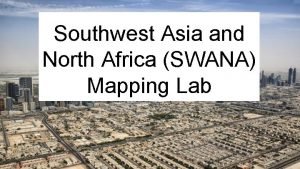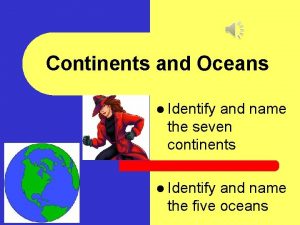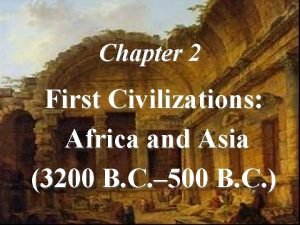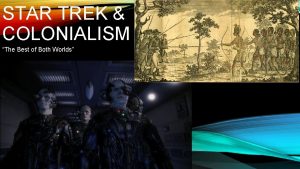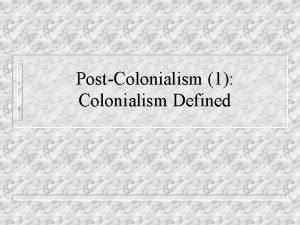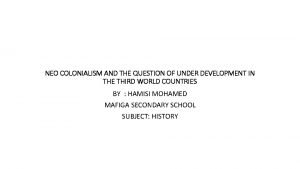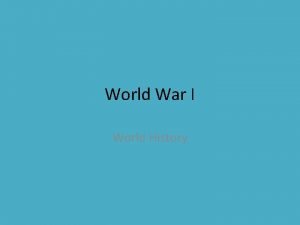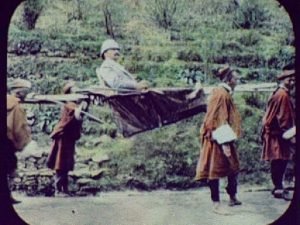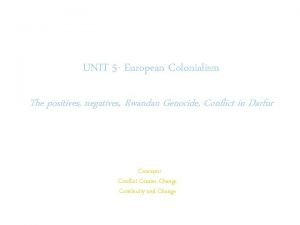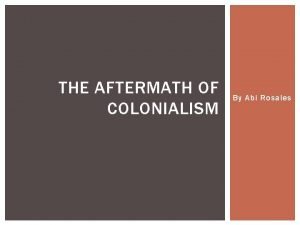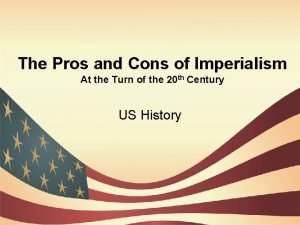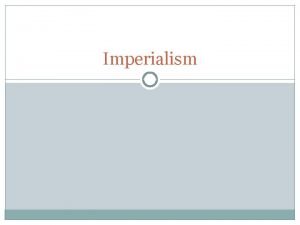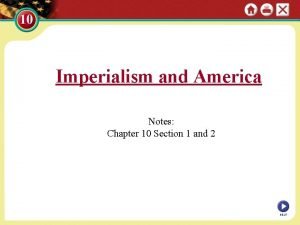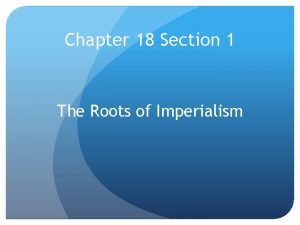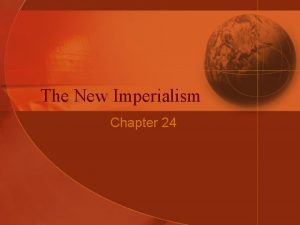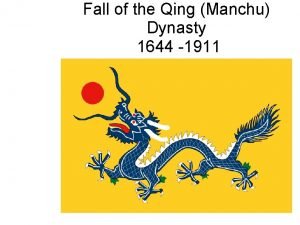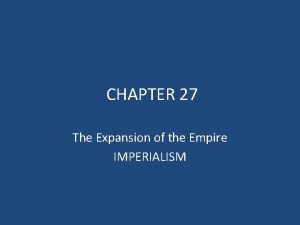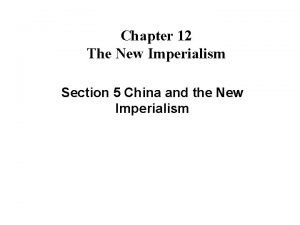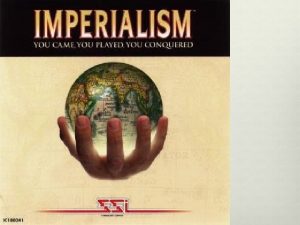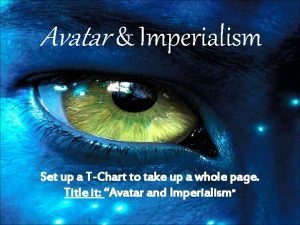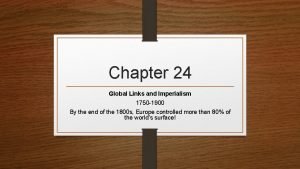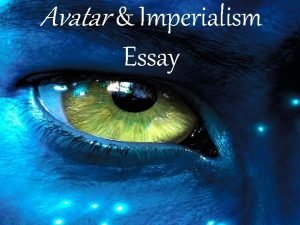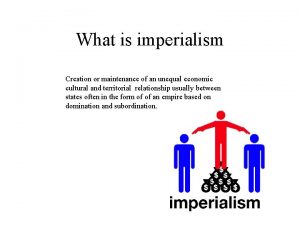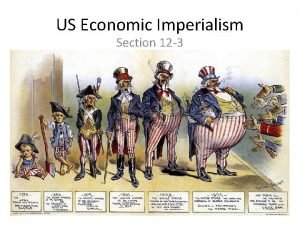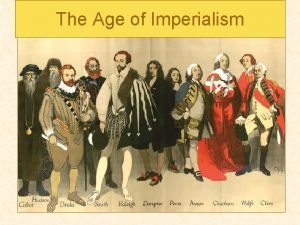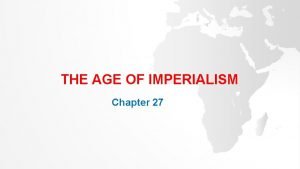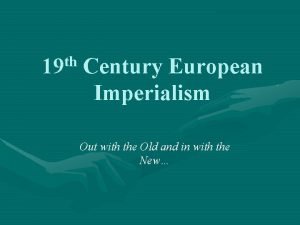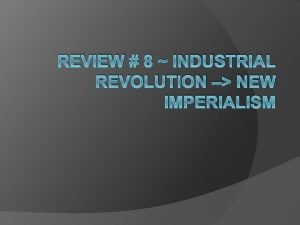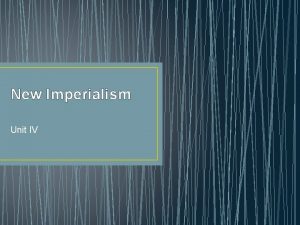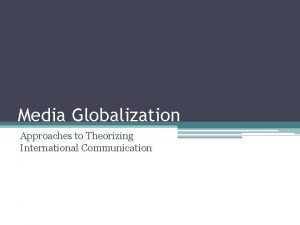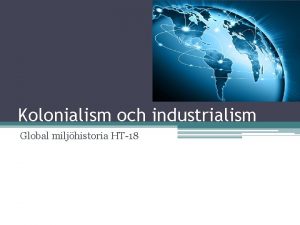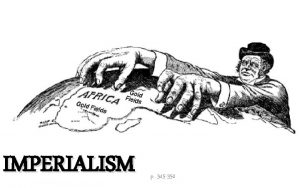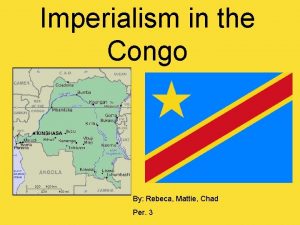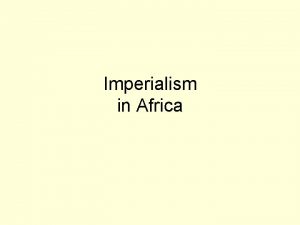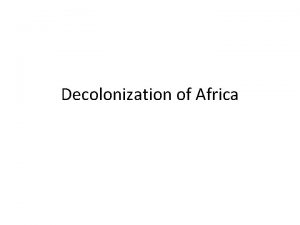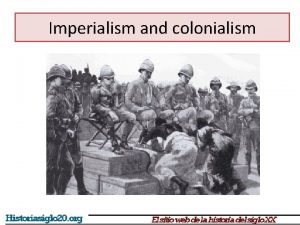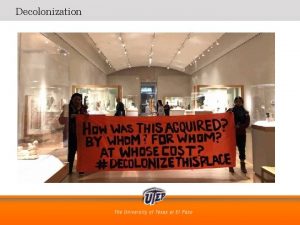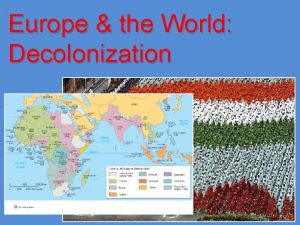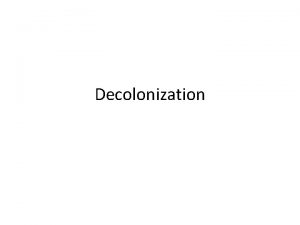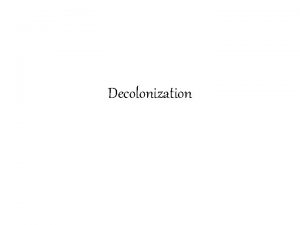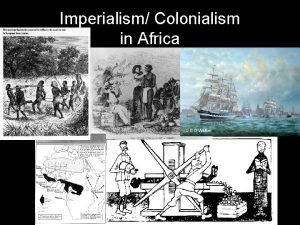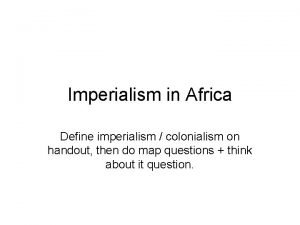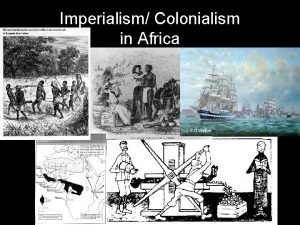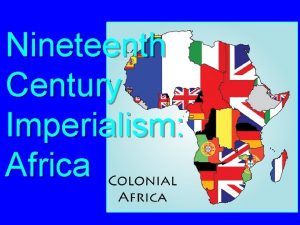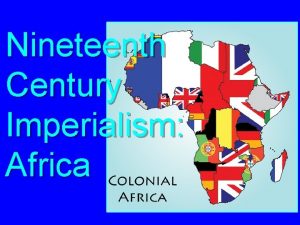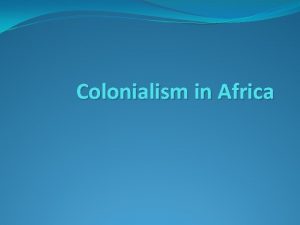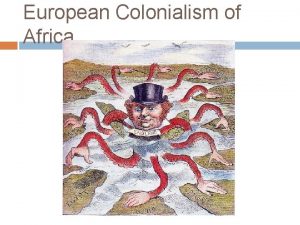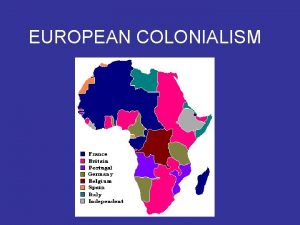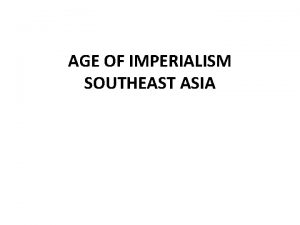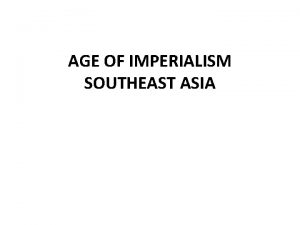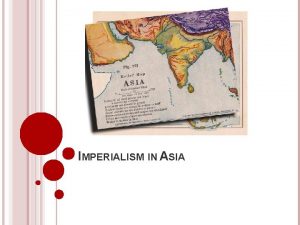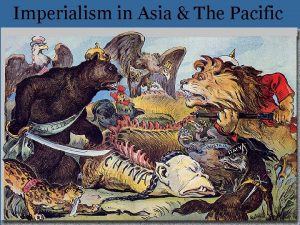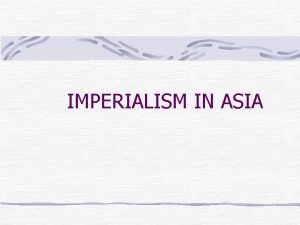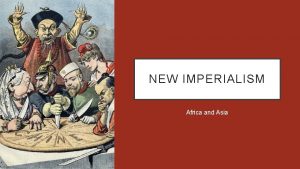COLONIALISM IMPERIALISM AND DECOLONIZATION IN ASIA AND AFRICA





























































































- Slides: 93

COLONIALISM, IMPERIALISM AND DECOLONIZATION IN ASIA AND AFRICA Dr. Sujata Menon

Definition- Colonialism and Imperialism Colonialism refers to the political, social, economic, and cultural domination of a territory and its people by a foreign power for an extended period of time. Imperialism refers to expansion of rule of a nation or empire over foreign nations and taking and holding foreign colonies. Dr. Sujata Menon- Colonialism and Imperialism 2

New Imperialism Refers to massive colonial expansion in late 19 th and early 20 th. c New imperialist powers were European powers, US and Japan in Asia, Middle East and Africa In just a couple of decades, nearly all of Africa and large areas of Asia and the Middle East was colonized by powers.

Causes of Imperialism Economic Motives The Industrial Revolution created an insatiable demand for raw materials and new markets. Nationalism European nations wanted to demonstrate their power and prestige to the world. Balance of Power European nations were forced to acquire new colonies to achieve a balance of power with their neighbors and competitors. The Europeans’ sense of superiority made them feel obligated to “civilize White Man's Burden the heathen savages” they encountered. Famous writing Rudyard Kipling “White Man’s Burden” Dr. Sujata Menon- Colonialism and Imperialism 4

European Colonialism European powers Portugal and Spain began the race of colonization. They were followed by Dutch, Britain and France. Britain, France, Dutch were successful in setting up their colonial empires in Asia and Africa replacing Spain and Portugal remained successful in setting up their colonial empires in South American colonies. Dr. Sujata Menon- Colonialism and Imperialism 5

The British Colonial Empire The British Empire was the largest overseas empire in the early 19 th century. The British Empire was, at one time, referred to as "the empire on which the sun never sets“. British colonies: thirteen English colonies of America, Indian subcontinent, south east Asia, Africa and in west Asia. Dr. Sujata Menon- Colonialism and Imperialism 6

Loss of British Thirteen colonies The colonies of North America. were a great source of raw material and a basis of British mercantile economy. In the American war of Independence Britain lost 13 colonies of America depriving the empire of its most prosperous. The loss of 13 colonies shifted the British colonial expansion to the "second British Empire" in Asia and Africa from the eighteenth century. Dr. Sujata Menon- Colonialism and Imperialism 7

The British Empire

New Imperialism- Africa Dr. Sujata Menon- Colonialism and Imperialism 9

The "Scramble for Africa" refers to the invasion, occupation, division, colonization and annexation of African territory by European powers between 1881 and 1914. It is also called the Partition of Africa and the Conquest of Africa. Dr. Sujata Menon- Colonialism and Imperialism 10

By 1914, European powers controlled 90% of Africa, with only Ethiopia and Liberia remaining independent. By the time World War I broke out, Britain and France collectively controlled 45% of Africa’s population and Germany 9%. Dr. Sujata Menon- Colonialism and Imperialism 11

The European powers that took part in partitioning of Africa were: Britain France Portugal Germany Belgium Italy Spain Dr. Sujata Menon- Colonialism and Imperialism 12

Dr. Sujata Menon- Colonialism and Imperialism 13

The occupation of Congo by King Leopold II in the 1870 s began the scramble. Fearing they would miss out on various raw materials, the other European nations scrambled to establish their presence on the continent.

Scramble for Africa – Berlin Conference-1884 -85 Intense rivalries among Belgium, France, Germany, Great Britain, Italy, Spain, and Portugal for additional African territory, and ill-defined boundaries of their various holdings, instigate the Berlin Conference of 18841885 (organized by Bismarck). The rules for the Scramble were laid down at the Berlin Conference of 18841885.

Berlin Conference The European powers agreed on a set of rules for annexing African territories. They signed various treaties that resulted in the partitioning, or division, of Africa into colonies with clearly defined borders. The Berlin conference helped in avoiding conflict among the European nations and gave peace in the European continent. The European peace subsequently increased European imperialism in Africa. Dr. Sujata Menon- Colonialism and Imperialism 16

Scramble for Africa – Belgian Congo the Berlin Conference made Leopold’s acquisitions legal. Leopold used forced labor in the production of rubber, ivory and minerals. As international protests intensified, the Belgian government took control of the Belgian Congo in 1908.

The British Empire in Africa-’Cape to Cairo’ The Rhodes Colossus—Cecil Rhodes spanning "Cape to Cairo". Dr. Sujata Menon- Colonialism and Imperialism 18

British Empire in Africa Dr. Sujata Menon- Colonialism and Imperialism 19

South Africa under British Led by the efforts of imperialist and capitalist Cecil Rhodes made fortune in diamonds( De Beers) , discovered in Cape Colony in 1869. He pressed for British expansion in Southern Africa. Tensions mounted in the 1880 s with the discovery of gold in Transvaal Resulted in Boer War

The Anglo-Boer War The war was from 18991902 and involved bitter guerrilla fighting. The British won, but at a great cost. . British Boers

European Territory AFRICA In 1910, with southern Africa secure, the British established the Republic of South Africa and instituted apartheid. Apartheid – government policy calling for separation of the races. South Africa Cape Colony Cape Town

France French Territory France was very powerful in North Africa, and later spread into West and Central Africa. The territory France controlled was as large as the United States.

Germany The newly formed German empire had to fight many battles against African natives to take lands in the southern half of Africa. German Territory Germany would lose its colonial territories after its loss in World War I.

Italy The Italians crossed the Mediterranean and conquered Libya. They then took Somaliland in the horn of Africa, but were beaten badly by the Ethiopians. Italian Territory

King Leopold and other wealthy Belgians exploited the riches of the Congo, and brutalized the natives. Many Africans were enslaved, beaten, and killed. Belgium Territory

Portugal and Spain Although the leaders of the old imperialism, the African claims of the Portuguese and Spanish were minimal. Portuguese Territory Spanish Territory

Europeans In Africa By 1914 Britain France Germany Italy Belgium Portugal Spain

Independent Liberia

Independent Africans After the slave trade was outlawed, liberals in the United States promoted the idea of returning freed slaves to Africa. In the early 1800 s, President Monroe helped free slaves settle in Liberia. The former slaves named the capital city Monrovia in his honor. President Monroe

Independent Ethiopia Menelik

Independent Africans The Ethiopians kept their freedom through a successful military resistance. Emperor Menelik II modernized the army, along with roads, bridges, and schools. When the Italians invaded they were defeated so badly by Menelik that no other Europeans tried to take Ethiopia.

Decolonization in Africa Jomo Kenyatta Kwame Nkrumah The decolonization process in Africa started post World War II Rise of Pan African Nationalism Independent rule in Liberia and Ethiopia The first African country to become independent in Africa was Ghana in 1957. Western Educated elite leaders spearheaded the ideas of self-determination. Some of the prominent African national leaders were: Jomo Kenyatta (Kenya), Kwame Nkrumah (Gold Coast, now Ghana), Julius Nyerere (Tanzania), Léopold Sédar Senghor (Senegal), and Félix Houphouët. Boigny (Côte d'Ivoire). Dr. Sujata Menon- Colonialism and Imperialism 33

1960, the year of Africa The year 1960 was heralded throughout Africa and the West as "the Year of Africa" for Decolonization of African states. During that year, seventeen African territories gained independence from the strong arm of European colonial rule. These seventeen nations joined the United Nation's General Assembly and Non-alignment Movement. Dr. Sujata Menon- Colonialism and Imperialism 34

IMPERIALISM IN CHINA © Student Handouts, Inc. www. studenthandouts. com

Qing (Manchu) Dynasty 1644 -1910 China was a rich country and China was under the Rule of Qing Dynasty - 1644 -

Early Contacts with Europeans. Canton System The ruling Qing dynasty adopted Single Port Commerce System in 1757 to restrict European trade and influence. Only one port i. e. southern port of Canton was opened for trade with the west. This policy resulted into the Canton System (1757– 1842) The policy served as a means for China to control trade with the west.

First Opium War (1839 -1842) � The British had to pay in gold and silver for importing Chinese goods - tea, silk, jade and porcelain which were in high demand. This created trade deficit for Britain. � To cover up the trade deficit, the EIC started smuggling opium from India into China on a large scale. � British brought opium from India to Canton through illegal ways › Many Chinese became addicts � Chinese emperor forbade opium imports › War between British and Chinese began › China was defeated and forced to give Britain ‘Most Favored Nation’

Result of the war-The Treaty of Nanking (1842) Important clauses: › Opening of Four Ports for British: �Amoy, Ningpo, Foochow, Shanghai › Hong Kong was leased to Britain › China had to pay an indemnity › China limited to 5% tariff › extraterritorial rights to British and most favoured nation q Extraterritorial rights- the British subjects in China were answerable only to British law, even in disputes with Chinese- exempted Westerners from Chinese law. q Most favoured nation clause- whenever any nation extracted a new privilege from China, that privilege was extended automatically to Britain. Dr. Sujata Menon- Colonialism and Imperialism 39

Second Opium War (1856 -1860) and opening up of china � Also known as the Arrow War � Unequal treaty- The Treaty of Tientsin which resulted in › More Chinese ports opened up to European trade › Opium traffic legalized › Protection of Christian missionaries › All foreign vessels could navigate the Yangtze River freely

Entry of Japan- The first Sino Japan War-189495 � To control Korea- Korea was a tributary state of china and was important for its strategic location and natural resources both for china and Japan. � The war was a disaster for china as imperialist Japanese gave a crushing defeat. � China was forced to cede Korea, the island of Taiwan , Formosa and part of Manchuria to Japan.

Sphere of Influence or areas of economic and political control With the opening up of china Britain, France, Germany, Russia and Japan began to construct their own ‘spheres of influence’ or areas where a European nation could control trade without interference from other Western nations within China. This division of China into spheres of influence has been often described as the “cutting of the Chinese melon”. Dr. Sujata Menon- Colonialism and Imperialism 42

New Scramble for China � France › Kwangchow – 99 -year lease � Germany › Shantung Peninsula – sphere of influence � Great Britain › Wei-hai-wei – naval base › Yangtze valley – sphere of influence � Russia › Liaotung Peninsula – lease › Manchuria – economic concessions

Imperialism in China

Entry of US and Open Door Policy In 1899 the United States, entered into Chinese competition. United States feared that China would be completely parcelled out to France, Russia, Germany and Britain, because of those ‘spheres of influences’. United States suggested the policy known as “Open door policy” or “me too policy’’ in 1899. Under this policy, no country would gain dominance in China, and economic trade would be free and open to all parties. It means: Ø Powers had Free access to treaty port Ø China’s independence and territory would remain intact Ø All nations could trade equally in China The policy was not always strictly followed

Advantage of to US Open Door Policy This policy protected American trading rights in China. Kept China free from colonization But China was still at the mercy of economic imperialism by foreign powers.

Rise of Chinese Nationalism. Boxer Rebellion (1900) � Chinese people resented foreign influence and power � A major uprising took place in 1900 against the western powers ruling in china. � The uprising was carried by a secret Chinese organization known as “Yihetuan” or Order of the Patriotic Harmonious Fists › Called “Boxers” by Westerners › Demanded that foreigners leave China › Killed and vandalized foreign property � European imperialists, Americans, and Japanese put down the rebellion � China government paid compensation for damages of uprising.

Fall of the Qing (Manchu) Dynasty-1911 The Qing dynasty was weakened after the Boxer Rebellion. Sun Yat-sen (Sun Yixian) Founded Kuomintang (Nationalist party) �Overthrew Manchu (Qing) dynasty �Established a republic

Growth of Communism Sun Yat-sen appealed for Russian aid following the Versailles Conference in 1919 1921 -1925 – China received advisors, arms, communist propaganda, and loans Chinese flag, 1912 -1928

Split in Party Kuomintang Right wing Business people Politicians Left wing Communists Intellectuals Radicals Students

Nationalists Vs Communists Sun Yat-sen succeeded by Chiang Kai-shek � Communists Leader – Mao Tse-tung (Mao Zedong) � Nationalists – Chiang Kai-shek Presidential Palace under Kuomintang Government in Nanjing

Civil War in China � 1927 -1932 and 1933 -1937 – war between Communists and Nationalists � War halted 1932 -1933 and 1937 -1945 to fight Japanese aggression � Communists were victorious in 1949 � Nationalists retreated to Formosa (Taiwan) � End of imperialism in China › Hong Kong returned to China in 1997

Mao Zedong and Communist China Mao wanted to create an ideal communist society and china an Industrial giant. The Great Leap Forward – 1958 -1963 Mao in 1956 introduced a Five-Year Plan to turn China into an industrial power. The plan was implemented by using the massive manpower of the country organised on the basis of communes. urban and rural workers were sent to communes to work. By 1958, the whole of China was organised into communes with about 700 million people. Agriculture suffered as more emphasis was on steel production. There was famine for three years By 1961, China had to import grain and impose rationing. Between 1959 -1962, over 20 million Chinese starved to death. Dr. Sujata Menon- Colonialism and Imperialism 53

The Great Proletarian Cultural Revolution or Cultural Revolution of china-1966 -1976 It was a socio political movement to secure Maoism and eliminate Political Opponents. Mao mobilized young people to spread the ideology of ‘true communism’ across the country. Hundreds of thousands of students left their schools to spread Mao’s message. Anyone who complained was accused of being a bourgeois or anti communist. The Cultural Revolution caused China’s economy to collapse. The agricultural production and industrial dropped dramatically during the ten harsh years. Dr. Sujata Menon- Colonialism and Imperialism 54

The Dutch East Indies Indonesia Dr. Sujata Menon- Colonialism and Imperialism 55

Indonesia- The Spice Islands Several European countries were attracted to Indonesia or Spice Islands because of its exotic resources and its prime location for trade. Indonesia had hotly coveted resources, such as spices, cloves, nutmeg, and sugar. Dr. Sujata Menon- Colonialism and Imperialism 56

Netherlands’ United East India Company (Verenigde Oostindische Compagnie) In 1602, the VOC or Netherlands’ United East India Company (Verenigde Oostindische Compagnie), was formed. A fortified base was established in Batavia (Jakarta), and became the headquarters of the Dutch East Indies Company. The VOC controlled Indonesia indirectly until the eighteenth century, when company began to decline due to a decrease in profits from trade and the interruption of Indonesian pirates. Following the company's bankruptcy in 1800, Indonesian territory under its administration was nationalized and the Dutch government took direct control of Indonesia. Dr. Sujata Menon- Colonialism and Imperialism 57

The Dutch exploited the colony, its natural resources, and the labour force in Indonesia. To assure high profits, the Dutch established the Cultuurstelsel, or the Cultivation System, a system in which peasants and famers were forced to grow commercial crops for the Dutch and for the local governments. Dr. Sujata Menon- Colonialism and Imperialism 58

During the Second World War, Holland was Nationalism and occupied by Nazi and Indonesia by Japan. decolonization Japanese removed Dutch control during the war. The changing leadership led to the growth of Sukarno national groups who resented Dutch imperialism. Nationalists such as Sukarno, led the Indonesian liberation movement. Indonesian independence was declared on August 17, 1945, and officially recognized by the Netherlands in December 1949 Sukarno was declared President and he established the Republic of the United States of Indonesia. Nationalists erased all types of cultural and linguistic links with their Dutch colonists Sukarno-1945 -67 Dr. Sujata Menon- Colonialism and Imperialism 59

Imperialism in Middle East Dr. Sujata Menon- Colonialism and Imperialism 60

Ottoman Empire (1878 -1914)

Decline of Ottoman Empire During 1800’s, European influence in the Middle East grew The Ottoman Empire gradually started to lose territory to European nations – The Empire began to be called the “sick man of Europe” since it was on the decline.

World War I Ottoman Empire sides with Germany (Central Powers). At the end of First World War allies partitioned the Ottoman Empire.

After the war… The partitioning of the Ottoman Empire led to the creation of the modern Arab countries and greater influence of western powers mainly Britain and France in the Middle East. Versailles Treaty gave many of Turkey’s provinces to powers Treaty gave mandates (territories administered by a nation but not owned) to the victorious western Powers �Britain gets Iraq, Transjordan, and Palestine �France gets Syria and Lebanon

Mandates After World War I

Interest in Middle East The discovery of oil in the Middle East in the early 20 th century generated great interest among the western powers. Increasing demand for oil in the 1920 s and 30 s brought European and American oil companies which dominated the local governments of Iran, Iraq, Kuwait and Saudi Arabia. Dr. Sujata Menon- Colonialism and Imperialism 66

Turkey and Mustafa Kemal Ataturk Ottoman Empire collapsed at the end of WWI. The nation of Turkey was all that was left out of the Ottoman Empire after World War I. Mustafa Kemal Considered as Ataturk or “father of modern Turkey, modernize Turkey In 1922 overthrew the sultan and declared Turkey the republic Reforms of Ataturk Modernization – built factories, separated religion from the state Westernization – used western law model, calendar and metric system, banned hijab and fez **Many Muslims were angered by these policies of westernization. But Kemal successfully modernize Turkey. His example was followed by other Arab Nationalists

Struggle for Iran The nation of Persia was under monarchy and ruled by Shah. European powers mainly Britain and Russia had interest and businesses in Persia’s oil fields Shahs were weak; unable to resist European expansion

Reza Khan In 1921, an Iranian officer Reza Khan takes over the government and created the Pahlavi Dynasty. During the Second World War, the Pahlavi's Government aligned with Hitler. Reza Shah followed Kemal’s example and modernized Persia. Reza Shah Pahlavi used Persia's oil fields to make money for the nation. Tried to end foreign control Attempted to modernize Iran

Cont. In 1979, Pahlavi dynasty under Reza Khan was overthrown. Events leading to the overthrow of Pahlavi dynasty is known as the Iranian Revolution or Islamic Revolution. Iran became republic under the Ayatollah Ruhollah Khomeini, the leader of the revolution. Dr. Sujata Menon- Colonialism and Imperialism 70

Rise of Modern Egypt had been held by the British as a protectorate since the late 1800 s In Early 1800’s, Egypt became focus of rivalry between France and Britain Both nations wanted to build and control the Suez Canal

Muhammed Ali Considered the “father of modern Egypt” Governor of Egypt in early 1800’s Attempted to modernize Egypt with reforms Those who came after him created a large debt Egypt eventually sold rights to Suez canal to French and control of canal to British

Egyptian Independence Egyptian nationalist forces demanded independence. On 28 February, 1922, Britain gave Egypt limited independence But did not regain control of the Suez Canal.

Gamal Abdel Nasser and Suez Crisis, 1956 The rise of Arab Nationalism in Egypt after the Second World War created anti-west feelings and policies concerning Suez Canal. In 1954, Gamal Abdel Nasser became the president of Egypt. He wanted to remove foreign military presence in the Suez Canal zone. In Britain, Anthony Eden succeeded Churchill in 1955 who was an imperialist. The canal had been owned by the Suez Canal Company, which was controlled by French and British Dr. Sujata Menon- Colonialism and Imperialism 74

Nationalization of Suez Canal On July 26, Nasser abruptly announced the nationalisation of the Suez Canal Company. Britain and France feared that Nasser might close the canal and cut off shipments of petroleum flowing from the Persian Gulf to Western Europe. Britain and France secretly prepared military action to regain control of the canal and to depose Nasser. They found a ready ally in Israel- Egypt’s arch enemy. Dr. Sujata Menon- Colonialism and Imperialism 75

The combine military action of Anglo-French along with Israel in Suez Canal began in 1956. This military strike was highly opposed by the USA and UN which quickly put a stop to the Anglo-French action. On December 22 the UN evacuated British and French troops, and Israeli forces withdrew in March 1957. Nasser emerged from the Suez Crisis a victor and a hero for the cause of Arab and Egyptian nationalism. Suez Canal crisis brought an end of Britain and France as world powers. The Suez crisis is often portrayed as Britain's last fling of the imperial dice Dr. Sujata Menon- Colonialism and Imperialism 76

Palestine was under British Mandate. The previous relationships between religious groups in the area had been peaceful. As the British ruled the area, Jews and Muslims within Palestine came into conflict with each other.

Zionism Since the Roman times Jews were removed and dispersed from their home land - present day Israel/ Palestine region that led to Diaspora of Jews. Zionism Movement which seeks to re-establish a Jewish state in Palestine began in the late 1800’s Led by Theodor Herzl Driven by growth of anti-Semitism (hatred or fear of Jews) in Europe and elsewhere In 1940’s Jews from Europe begin to emigrate to Palestine

Birth of Israel The creation of Israel changed the history of the Middle East. After WWII, the United Nations partitioned the British mandate Palestine into a Palestinian state and a Jewish state called Israel was created on May 14, 1948 and was quickly recognised by the USA and Russia. The creation of Israel led to the intensification of Arab Nationalism. All Arab States rejected Israel. Ben Gurion was declared the first president of Israel in a climate of fear and violence. Dr. Sujata Menon- Colonialism and Imperialism 79

Arab Israel wars Israel General and Hero of Six Days War Moshe Dayan First Arab –Israel war, 1948 - Egypt, Iraq, Jordan, Lebanon, Saudi Arabia, Syria invaded Israel. Six Days War- Fighting broke out again in 1967 as Israel quickly defeated Egypt, Jordan, Syria, Iran in the Six Day War. Israel gained control of Jerusalem, the Golan Heights, West Bank, and Sinai Peninsula. Yom Kippur War- 1973 - Arabs attacked again, but Israel defended itself under the leadership of Prime Minister Golda Meir. Camp David Peace Accords - In 1978 Camp David Peace Accords signed between Egypt, Israel and US. Ø This was the first peaceful recognition of Israel by an Arab country. Egyptian president Anwar Sadat and Israel Prime Minister Menachem Begin were awarded with a Nobel Peace Prize in 1978 Dr. Sujata Menon- Colonialism and Imperialism 80

French Indochina

Indo China Indo-China comprises the modern countries of Vietnam, Laos and Cambodia. By the late 1880 s France controlled Vietnam, Laos and Cambodia - French Indochina became one of France’s most lucrative colonial possessions. Indochina imperialism was justified on the ground of mission civilisatrice (or ‘civilising mission’). Dr. Sujata Menon- Colonialism and Imperialism 82

French Indochina was divided into three separate pays (provinces): Tonkin in the north, Annam along the central coast and Cochina in the south. Colonists and French companies transformed Vietnam’s thriving subsistence economy into capitalist system based on land ownership, increased production, exports(Rubber) and low wages. Millions of Vietnamese no longer worked to provide for themselves; they now worked for the benefit of French colons. Dr. Sujata Menon- Colonialism and Imperialism 83

Vietnamese Nationalism Vietnamese nationalism began to grow in the beginning of the 20 th century. It was inspired by Japanese victory in the Russo. Japanese war of 1905 and 1912 republican revolution in china After the First World War, national movement started by Vietnam intellectuals. The most prominent of these was Communist leader Ho Chi Minh, who founded a militant nationalist organization called the Viet Minh. Dr. Sujata Menon- Colonialism and Imperialism 84

Ho Chi Minh Vietnam came under Japanese occupation in 1941. As soon as Japanese surrendered after the WWII, Ho Chi Minh, seized power and declared the country’s independence on behalf of the provisional government, officially proclaiming the birth of the Democratic Republic of Vietnam. Emperor Bao Dai was forced to abdicate. Dr. Sujata Menon- Colonialism and Imperialism 85

Post-1945 Vietnam was divided between Chinese and British Ho Chi Minch worked to get the Chinese out and replaced by the French. “The last time the Chinese came, they stayed a thousand years. The French are foreigners. They are weak. Colonialism is dying. The white man is finished in Asia. But if the Chinese stay now, they will never go. As for me, I prefer to sniff French shit for five years than to eat Chinese shit for the rest of my life. "

Outbreak of Franco. Viet Minh War Outbreak of fighting Nov. 1946, French sabotage in Cochin. China Ho goes to Paris in 1946 for negotiations The war lasted for eight-years. France justified this war as fight against communism. The Soviet Union and Mao Tse-Tung’s communist China gave support to the Viet Minh. France suffered heavy defeats and military casualties. France surrendered on 7 May 1954 as it became difficult to continue fighting this costly war from its shores on the sole ground of anti-communism.

Geneva Accords- Division of Vietnam The Geneva Accords of 1954 divided Vietnam into North Vietnam which came under Ho Chi and his Communist forces and South Vietnam under USA backed anti-Communist politician Ngo Dinh Diem. The Geneva Accords stipulated that the divide was temporary and that Vietnam was to be reunified under free elections to be held in 1956. Dr. Sujata Menon- Colonialism and Imperialism 88

Geneva Conference of 1954 1. ) Division of Vietnam at 17 th Parallel 2. ) Elections in two years 3. ) Movement of peoples North and South 4. ) US takes “note” of the agreements, but is not a party to them

Ho Chi Minh vs. Ngo Dinh Diem

US and Vietnam War – 1954 -1973 With U. S. assistance, Diem took control of the South Vietnamese government in 1955, declared the Republic of Vietnam but cancelled the elections that had been scheduled for 1956. Diem’s regime proved corrupt, oppressive, and extremely unpopular. Still the United States continued its support fearful of the increasing Communist resistance from Ho Chi Minh and its communist party - National Liberation Front or Viet Cong. Dr. Sujata Menon- Colonialism and Imperialism 91

President Kennedy’s successor, Lyndon B. Johnson, pledged to keep U. S. involvement in Vietnam to a minimum. In 1964 after the Gulf of Tonkin incident in which North Vietnamese forces allegedly attacked U. S. Navy ships, Johnson was forced to send U. S. troops. The Viet Cong’s guerrilla tactics frustrated and demoralized U. S. troops. Dr. Sujata Menon- Colonialism and Imperialism 92

End of Vietnam War During next president Nixon’s time the Vietnam conflict expanded to nearby neutral nations like Cambodia and Laos which had Viet Cong sites. Nixon was forced to push for a peace settlement. The cease-fire was finally signed in January 1973, and the last U. S. military personnel left Vietnam in March 1973. North Vietnamese forces stepped up their attacks on the South and finally on April 30, 1975, the South Vietnamese capital, Saigon fell to the North Vietnamese. Vietnam was united and came under Communist rule as the Socialist Republic of Vietnam, thus ending the period’s bloodiest Vietnam War. Dr. Sujata Menon- Colonialism and Imperialism 93
 European imperialism webquest
European imperialism webquest Colonialism vs imperialism
Colonialism vs imperialism Decolonization of asia
Decolonization of asia Colonialism vs imperialism venn diagram
Colonialism vs imperialism venn diagram Old imperialism vs new imperialism chart
Old imperialism vs new imperialism chart Old imperialism vs new imperialism
Old imperialism vs new imperialism Imperialism in southeast asia and the pacific
Imperialism in southeast asia and the pacific Nationalism and decolonization
Nationalism and decolonization Imperialism in southeast asia chapter 11 section 5
Imperialism in southeast asia chapter 11 section 5 New imperialism in asia
New imperialism in asia Chapter 11 section 5 imperialism in southeast asia
Chapter 11 section 5 imperialism in southeast asia Chapter 27 section 5 imperialism in southeast asia
Chapter 27 section 5 imperialism in southeast asia Motivations for imperialism in asia
Motivations for imperialism in asia Chapter 11 section 5 imperialism in southeast asia
Chapter 11 section 5 imperialism in southeast asia Chapter 27 section 5 imperialism in southeast asia
Chapter 27 section 5 imperialism in southeast asia Colonialism and development: korea, taiwan, and kwantung
Colonialism and development: korea, taiwan, and kwantung Marx on imperialism
Marx on imperialism New imperialism africa
New imperialism africa Imperialism in africa berlin conference
Imperialism in africa berlin conference Describe imperialism in africa
Describe imperialism in africa The driving force behind european imperialism in africa
The driving force behind european imperialism in africa New imperialism africa
New imperialism africa Africa imperialism timeline
Africa imperialism timeline Legacy of imperialism
Legacy of imperialism Chapter 25 lesson 2 empire building in africa
Chapter 25 lesson 2 empire building in africa Decolonization regents questions
Decolonization regents questions Decolonization ap world history
Decolonization ap world history Decolonization acrostic poem
Decolonization acrostic poem Decolonization of the middle east
Decolonization of the middle east What is it
What is it Vietnam decolonization
Vietnam decolonization Decolonization
Decolonization Physical features in the middle east
Physical features in the middle east Southwest asia
Southwest asia Is israel in africa or asia
Is israel in africa or asia Goodguysww.
Goodguysww. Inlet of indian ocean between africa and asia
Inlet of indian ocean between africa and asia Colonial encounters in asia africa and oceania
Colonial encounters in asia africa and oceania Chapter 18 colonial encounters in asia and africa
Chapter 18 colonial encounters in asia and africa Country uniting africa and sw asia
Country uniting africa and sw asia North america south america asia europe africa
North america south america asia europe africa Kums definition geography
Kums definition geography European footholds in the eastern hemisphere
European footholds in the eastern hemisphere Southwest asia and north africa physical map
Southwest asia and north africa physical map North africa and southwest asia mountains
North africa and southwest asia mountains Physical map of swana
Physical map of swana 7 continents and 4 oceans
7 continents and 4 oceans Egypt in africa or asia
Egypt in africa or asia Post colonialism in tempest
Post colonialism in tempest Star trek colonialism
Star trek colonialism Example of colonialism
Example of colonialism Impact of neo colonialism on third world countries
Impact of neo colonialism on third world countries Post colonial theory
Post colonial theory First wave of colonialism
First wave of colonialism First wave colonialism
First wave colonialism French empire at its height
French empire at its height Cause of colonialism
Cause of colonialism What is post colonialism
What is post colonialism Negatives of colonialism
Negatives of colonialism Electronic colonialism theory
Electronic colonialism theory Colonialism thesis statement
Colonialism thesis statement Pros and cons of imperialism
Pros and cons of imperialism Opium wars defintion
Opium wars defintion Chapter 10 section 1 imperialism and america
Chapter 10 section 1 imperialism and america Chapter 18 section 1 imperialism and america
Chapter 18 section 1 imperialism and america Chapter 24 section 5 china and the new imperialism
Chapter 24 section 5 china and the new imperialism Chinese old hairstyle
Chinese old hairstyle China and imperialism
China and imperialism Chapter 12 section 5 china and the new imperialism
Chapter 12 section 5 china and the new imperialism Imperialism and industrialization
Imperialism and industrialization Avatar and imperialism
Avatar and imperialism Global links and imperialism
Global links and imperialism Chapter 10 building vocabulary america claims an empire
Chapter 10 building vocabulary america claims an empire Carcy writing
Carcy writing Imperialism defintion
Imperialism defintion South american map
South american map Facts about imperialism
Facts about imperialism When did hawaii get statehood
When did hawaii get statehood Chapter 27 building vocabulary the age of imperialism
Chapter 27 building vocabulary the age of imperialism Imperialism map 1914
Imperialism map 1914 What were the causes of imperialism
What were the causes of imperialism What three factors spurred american imperialism
What three factors spurred american imperialism Types of imperialism
Types of imperialism Causes of imperialism
Causes of imperialism Roots of american imperialism
Roots of american imperialism Facts about imperialism
Facts about imperialism Criticism of modernization theory
Criticism of modernization theory Knna
Knna Economic imperialism definition
Economic imperialism definition Direct imperialism
Direct imperialism Imperialism of congo
Imperialism of congo What is direct rule in imperialism
What is direct rule in imperialism Psywar
Psywar Imperialism time period
Imperialism time period
